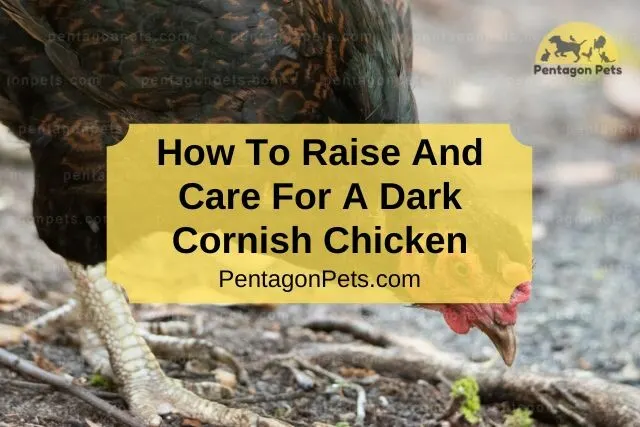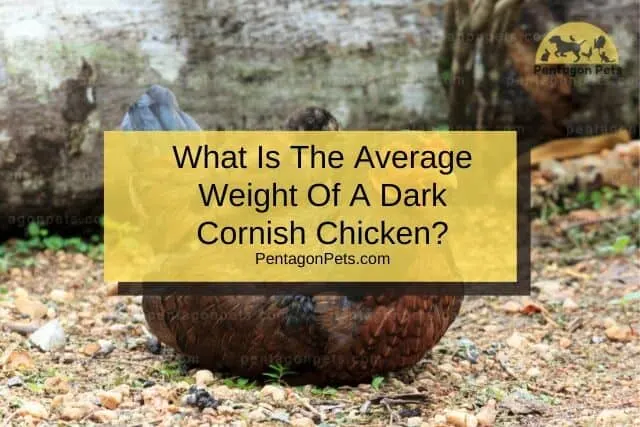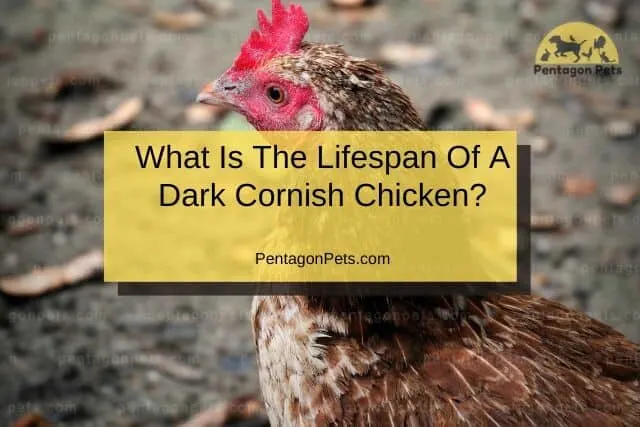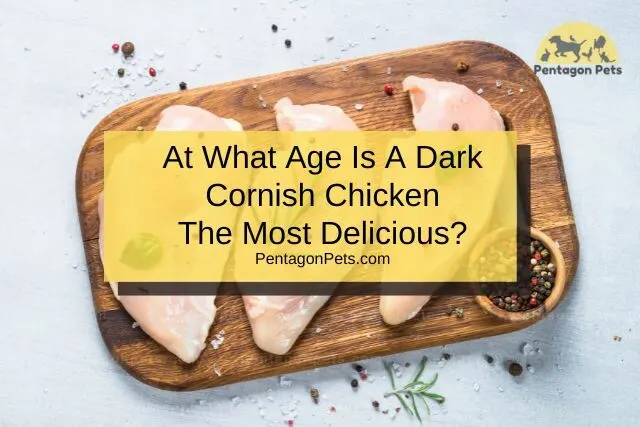Dark Cornish chickens are a large, dual-purpose breed that can be raised for their eggs and their meat. While they don’t have an abundance of requirements, there are certain things that can make or break your success with the Dark Cornish chicken.

To raise and care for a Dark Cornish chicken, prioritize providing a balanced diet rich in protein, spacious living conditions to accommodate their muscular build, and regular health check-ups to monitor their well-being. Their unique physique requires more space and nutrition than average chickens.
Dark Cornish chickens are renowned for their impressive physique and strength, traits that require special attention to their diet to ensure they develop properly. These birds are like athletes; just as a sprinter needs a diet tailored to their high-energy demands, Dark Cornish chickens thrive on feed that supports muscle growth and overall health. High-quality feed, rich in protein, along with supplements if necessary, will help maintain their robust health and striking appearance.
However, their heavy build also makes them less adept at flying, which means they can be more susceptible to predators if allowed to free-range without adequate protection. Ensuring a secure outdoor space is critical. It’s like safeguarding a fortress; the walls (or in this case, fences) need to be strong and tall enough to protect the valuable treasures inside. Providing a safe, spacious environment allows them to express their natural behaviors while keeping them safe from harm.
How Big Does Dark Cornish Chicken Grow?
Dark Cornish chickens have a big appetite, which is apparent when you look at the average size of this breed.
Dark Cornish chickens are a large bird that has an average weight of 8 to 10 1/2 pounds, depending on the sex. The females of the breed have large breasts, which make for a nice-sized table bird with tender and delicious meat.
What Is The Average Weight Of A Dark Cornish Chicken?

The Dark Cornish is a heavy chicken breed that makes an impressive table bird.
Dark Cornish roosters weigh an average of 10 1/2 pounds, while the hens can weigh between 7 1/2 and 8 pounds. Their feathers are various shades of brown and they have two lighter streaks that go down their backs. Their feet and legs are yellow in color, which stands out against their dark feathers.
Because Dark Cornish chickens are a heavier breed, they can experience issues associated with their weight, such as leg and foot problems and the potential to develop obesity.
When Will A Dark Cornish Chicken Start Laying Eggs?
When you can expect your chickens to start laying eggs, it is important information that you should know. Even if you’re not wanting the birds for their eggs, this info can help determine if there is something wrong with your hens.
Dark Cornish hens typically start laying eggs between 18 to 24 weeks of age, although this can vary a few weeks earlier or later. The Dark Cornish chicken isn’t a great layer and is bred for their meat instead of their eggs.
If your Dark Cornish hens are not producing any eggs and they are well past 24 weeks old, the bird may be stressed, not getting the right nutrition, or experiencing health problems.
Will A Dark Cornish Chicken Lay White Or Brown Eggs?

Most people associate chicken eggs with the color white, thanks to the crisp color of eggs typically found in grocery stores. However, white shells are just one of the many colors of eggs that chickens can produce.
Dark Cornish chickens lay medium to large brown eggs that can range from a creamy to light brown shade. They lay between 160 to 180 eggs a year, with most eggs being produced during the spring and summer seasons.
Do You Need A Same Breed Rooster To Get A Dark Cornish Chicken To Lay Eggs?
If you have never raised chickens before, you may assume that you are required to have a rooster in order to get your hens to start laying eggs. But are roosters really necessary to get eggs?
Dark Cornish hens will lay eggs throughout the year without a rooster being present. These eggs won’t be fertilized, however, which won’t be an issue if you are not planning on hatching the eggs. If you want to hatch the eggs, you will need a rooster for fertilization.
You can use any breed of rooster to mate with your hens, although the resulting chicks won’t be full-blooded. Instead, the chicks will be a mixture of the hen’s and the rooster’s breed. This is a fairly common occurrence in backyard flocks and there haven’t been any reported issues with cross-breeding chickens.
What Is The Lifespan Of A Dark Cornish Chicken?

Chickens do not have an overly long lifespan, which can be a good or bad thing depending on why you are raising the birds. Let’s take a look at the average lifespan of the Dark Cornish breed.
Dark Cornish chickens have an average lifespan of about 5 to 8 years. To help ensure your chickens live for as long as possible, raise your flock in clean and healthy conditions. This includes regular coop cleaning and implementing preventive care.
Are Dark Cornish Chickens Friendly?
Each breed of chicken has its own temperament that you should consider when trying to determine which breeds to add to your flock.
Dark Cornish chickens are not overly friendly birds, and they do not particularly like human contact. In fact, this breed usually tries to avoid humans. So if you’re looking for a chicken to keep as a pet, the Dark Cornish isn’t the right breed for you.
That doesn’t mean that the Dark Cornish chicken is aggressive or will attack you. They are just not a cuddly breed and are rather high-strung.
How Many Eggs Can A Dark Cornish Chicken Lay A Day?

Dark Cornish chickens are a dual-purpose breed that can be raised for both their meat and their eggs.
Dark Cornish hens lay about 3 eggs a week, although it isn’t uncommon for them to lay less than that amount. Expect no more than 180 eggs a year from this breed. These eggs are medium to large in size with a light brown color.
As you can see, the Dark Cornish chicken isn’t a heavy layer and are typically raised more for their meat then they are for the amount of eggs they produce. If you want to raise chickens for their eggs, there are other breeds that produce way more eggs. For example, Australorp chickens can lay 200 to 250 eggs a year, which is about 4 to 5 eggs every week.
When Will A Dark Cornish Chicken Stop Laying Eggs?
No matter what breed of chicken you are raising, they are bound to stop laying eggs at some point in their lives. Even if they don’t completely stop laying, the amount of eggs they produce will drastically decline as the years pass.
Dark Cornish hens can stop laying eggs after they reach 3 or more years of age. Additionally, it is not uncommon for them to stop laying in the winter months when the days are shorter and the nights are longer.
While it is a natural process for hens to stop laying as many eggs as they get older, there are some things you can do to help ensure your hens keep laying eggs for as long as possible. The two most important things are to ensure your hens are healthy and stress-free. This means providing them with the vitamins and minerals they need to maintain a healthy lifestyle, and giving them enrichment activities to keep them happy.
Pentagon Pet is the owner of this article that was first published on April 30, 2023.
At What Age Is A Dark Cornish Chicken The Most Delicious?

Even though Dark Cornish chickens are considered a dual-purpose breed, they are typically raised for their meat rather than their eggs. While you can harvest the Dark Cornish at any age, there is a certain time when the meat is the most delicious.
Butcher Dark Cornish chickens when they reach at least 18 weeks old. For the tenderest meat, harvest the birds before they reach 24 weeks old. Dark Cornish meat is considered “gourmet quality,” renowned for its amazing flavor and tenderness.
If you wait until the bird is over 24 weeks old, the meat can start to get a bit tough. This doesn’t mean it is inedible, but would work better for stews, soups, and other slow-cooking methods.
Best Housing Setup For A Dark Cornish Chicken
Before bringing Dark Cornish chickens home, make sure to have their house situated and ready for them. But what is the best housing setup for the Dark Cornish breed?
Each Dark Cornish chicken needs at least 6 square feet of floor space in the coop, but the more room the better. Dark Cornish chickens should also have a low roost positioned about 3 feet high, as they can hurt their breast and feet when they jump off the roost.
This breed loves to free-range, but you can use a run if you don’t feel comfortable allowing your birds to roam around your property. If you do use a run, make sure there is at least 10 square feet of run space per bird.
One nesting box for every four hens should be provided and these boxes should be 12×12 inches. Smaller breeds can get away with a smaller 8×8 nesting box, but the Dark Cornish hens need a bit bigger box.
Typical Health Problems Of A Dark Cornish Chicken

One of the drawbacks of Dark Cornish chickens is that this breed has a few health problems that they are prone to.
Dark Cornish chickens have a few different health problems that affect this large breed. The first being leg and foot problems, which can lead to even more issues with the bird. Additionally, Dark Cornish chickens have an insatiable appetite, which can lead to obesity.
It can be difficult to stop leg and foot problems once they happen, so it is best to prevent them to begin with. Proper nutrition and not allowing the birds to jump down from high places will go a long way to protecting Dark Cornish chickens. You should also take care not to overfeed the Dark Cornish chickens as this will reduce the chance of obesity.
Typical Problems Raising Dark Cornish Chicken
Even though chickens are fairly easy to raise, there are some problems associated with certain breeds. Knowing what these problems are will help you better prepare for the birds.
Dark Cornish hens have a tendency to be a bit broody and they can even have fertility problems. This breed also doesn’t tolerate the cold very well, and can become overheated when temperatures are high. Thankfully, some of these issues can be prevented.
Ensuring the coop is well ventilated, providing the birds with fresh water every day, and giving the chickens shade will all go a long way to keeping them protected from excessive heat and cold. During the summer when the temperatures are rising, consider putting a mister in your yard for your chickens to cool themselves.
What Type Of Food Is Best For A Dark Cornish Chicken?

The food you feed your flock will have a direct impact on how healthy they are. If they are not provided with the right type of food, they can experience nutritional deficiency, which leads to a slew of health issues that can negatively affect your birds.
Dark Cornish chickens don’t have any specialized dietary needs and will do well if provided a high quality commercial chicken feed. Dark Cornish chickens will also supplement their diet with various grains, seeds, and insects they find while scratching and foraging.
The most important thing to remember is that, like with other breeds, Dark Cornish chickens need fresh water and food provided to them every day.
Related Articles
How To Raise And Care For Kosher King Chicken
How To Raise And Care A Buckeye Chicken
How To Raise And Care For Chantecler Chicken
How To Raise And Care For Cornish Cross Chicken
This article and its contents are owned by Pentagon Pets and was first published on April 30, 2023.
